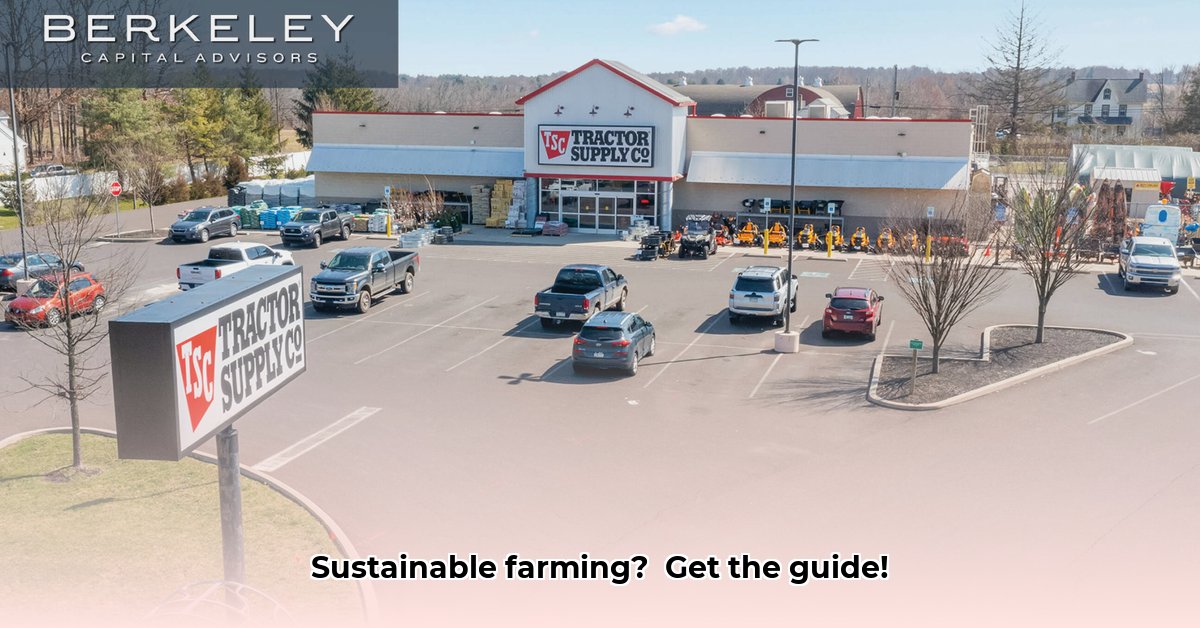
Tractor Supply Company: A Rural Retail Giant Facing Sustainability Scrutiny
Tractor Supply Company (TSC) serves as a vital resource for farmers, ranchers, and pet owners across rural Pennsylvania, including the community of Bedminster. The recent temporary closure of the Bedminster store, however, highlights underlying questions about TSC's role in sustainable agriculture and its commitment to environmental responsibility. For more information on TSC's equipment offerings, check out their riding mowers page. This article examines TSC's product range, its sustainability initiatives (or lack thereof), the implications of the Bedminster closure, and offers actionable recommendations for all stakeholders to foster a more sustainable future. Is TSC truly supporting sustainable farming practices, or is its impact on the environment far less positive than it appears?
TSC's Product Portfolio: A Necessary But Insufficient Contribution
TSC's extensive product catalog caters to a diverse range of needs within rural communities. From livestock feed and farm equipment to gardening supplies and pet necessities, the company provides essential goods and services. However, the breadth of its offerings raises questions. Does the product selection adequately reflect a commitment to sustainable agricultural practices? While TSC stocks some organic seeds and water-efficient irrigation systems, the absence of a clear, comprehensive sustainability strategy suggests a gap between their current offerings and the growing demand for truly eco-friendly products and processes. How many of their products are sourced sustainably? This critical question must be addressed transparently.
Sustainability Concerns: A Lack of Transparency and Concrete Action
A significant concern is the lack of readily available information regarding TSC's commitment to sustainability. Their website doesn't prominently feature a robust sustainability program or detailed reports outlining their environmental impact. This lack of transparency raises serious questions about their corporate social responsibility. The absence of clear information on waste reduction programs, sustainable sourcing of materials, and broader environmental initiatives hinders the ability to fully assess their contributions to sustainable agriculture. What specific efforts are in place to minimize their carbon footprint? Quantifiable data is needed to support any claims of positive environmental impact.
The Bedminster Closure: A Symptom of Broader Challenges?
The temporary closure of the Bedminster, PA store adds another dimension to the sustainability discussion. While the reasons behind the closure remain unclear, it highlights the challenges facing rural retailers, the delicate balance between profitability and social responsibility, and the potential consequences of neglecting environmental concerns. Could this closure represent a failure to adapt to changing consumer preferences and a growing demand for businesses that prioritize environmental sustainability? The economic factors involved warrant further investigation. How resilient is TSC's business model in the face of shifting priorities, from consumers and regulators, regarding environmental responsibility?
Stakeholder Analysis and Call to Action
Moving forward, a collaborative approach is essential to bridge the gap between current practices and the urgent need for improved sustainability within the rural retail sector. This requires actions from several stakeholders.
1. Tractor Supply Company:
- Conduct a comprehensive sustainability audit (including a carbon footprint analysis).
- Publish transparent annual sustainability reports reflecting quantifiable progress in key areas.
- Develop and implement ambitious waste reduction and recycling programs.
- Expand the selection of eco-friendly products to meet the growing consumer demand for sustainable options.
- Increase transparency regarding supply chain practices, emphasizing the sourcing of sustainably produced materials.
2. Rural Communities:
- Support local businesses committed to sustainable practices.
- Engage with TSC directly, expressing concerns and expectations regarding environmental responsibility.
- Advocate for policies promoting sustainable agriculture and the adoption of environmentally sound business practices.
3. Consumers:
- Make conscious purchasing decisions, prioritizing businesses and products demonstrably committed to sustainability.
- Engage in responsible consumption by reducing waste and supporting ethical sourcing.
- Voice concerns and expectations regarding sustainable practices when interacting with companies like TSC.
4. Government Agencies (e.g., USDA):
- Offer incentives and grants to encourage businesses to adopt more sustainable practices.
- Create clear and enforceable regulations to foster sustainable agriculture within the retail sector.
- Invest in research and development focused on enhancing the sustainability of agricultural practices.
Conclusion: A Shared Responsibility for a Greener Future
The future of Tractor Supply Company, the well-being of rural communities, and the health of our planet are inextricably linked. TSC's current approach to sustainability lacks sufficient transparency and concrete action. A collaborative effort among TSC, rural communities, consumers, and government agencies is crucial to ensure a more environmentally responsible future for the agricultural sector. The temporary closure of the Bedminster store serves as a stark reminder of the urgent need for businesses like TSC to adapt and integrate sustainability into all aspects of their operations. The time for action is now.